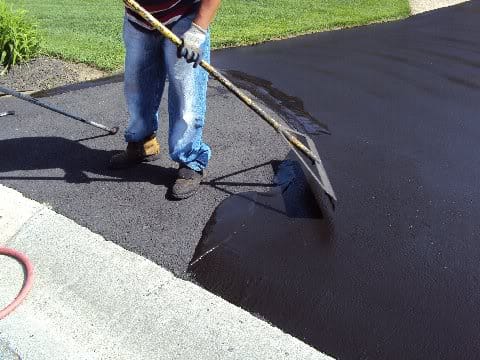Swift Solutions for Asphalt Spot Repair: Ideal Sealing Techniques
Swift Solutions for Asphalt Spot Repair: Ideal Sealing Techniques
Blog Article
Cold Mix Asphalt Vs. Hot Mix Asphalt: Which Is Right for You?

Make-up Differences
Cold mix and hot mix asphalts vary substantially in their make-up, with distinctive attributes that affect their performance and applications. Cold mix asphalt is created by emulsifying the asphalt binder with water and an emulsifying agent before blending it with accumulation. This method allows for the asphalt to be convenient at lower temperatures, making it perfect for temporary fixings and for use in colder weather. Hot mix asphalt, on the various other hand, is made at heats, typically in between 300-350 ° F, which assists to achieve better compaction and a more durable final item. The warm mix asphalt production procedure includes warming the aggregate and asphalt binder separately before integrating them at the asphalt plant.
Furthermore, cool mix asphalt often tends to be much less thick and more flexible than warm mix asphalt. This versatility makes it far better matched for locations with higher levels of activity, such as driveways or roads with rush hour. On the other hand, hot mix asphalt is known for its high durability and resistance to rutting and breaking, making it a preferred choice for highways and high-traffic roads where longevity is crucial.
Installation Process Differences
The procedure of installing chilly mix and hot mix asphalt displays noteworthy differences in their needs and treatments. In comparison, warm mix asphalt demands a more fancy installation procedure. Due to the heating demands, warm mix asphalt setups are normally lugged out by professionals with specific devices, making sure a more permanent and structurally audio result.
Durability and Durability Aspects
When taking into consideration asphalt alternatives, durability and longevity are crucial aspects to examine for long-term sidewalk efficiency. Warm mix asphalt (HMA) is recognized for its extraordinary resilience and durability. The high temperature levels during the mixing and laying process enable much better compaction, resulting in a denser and stronger sidewalk structure. This leads to HMA being much more immune to rush hour loads, harsh climate condition, and the impacts old compared to cold mix asphalt (CMA)
In terms of durability, HMA generally surpasses CMA due to its exceptional toughness and resistance residential or commercial properties. HMA sidewalks have a longer service life, needing much less regular repairs and upkeep, which can translate to set you back financial savings in the long run. In addition, HMA pavements are extra quickly adjustable to fulfill particular task demands, even more boosting their sturdiness.
Price Considerations
Thinking about the monetary ramifications is a vital facet when assessing the choice between hot mix asphalt (HMA) and cool mix asphalt (CMA) for sidewalk projects. While the initial price of warm mix asphalt is commonly higher than that of cold mix asphalt, HMA frequently provides an extra affordable service in the long run due to its exceptional additional hints sturdiness and longevity.
In addition to product costs, it's vital to take into consideration the costs linked with installation and upkeep when contrasting HMA and CMA. Ultimately, the decision between HMA and CMA need to take right into account not just the first cost however likewise the long-term monetary effects to identify the most cost-efficient choice for the you could try these out specific pavement job.
Environmental Influence Comparison
Contrast of the environmental impacts in between warm mix asphalt (HMA) and cold mix asphalt (CMA) discloses distinct differences in sustainability methods. HMA manufacturing calls for high temperature levels, resulting in boosted power consumption and greenhouse gas exhausts. The procedure also releases unstable natural compounds (VOCs) and hazardous air contaminants (HAPs) right into the environment. In contrast, CMA is produced and applied at reduced temperatures, decreasing power use and exhausts substantially. The lower production temperature levels of CMA lead to decreased fuel usage and lower degrees of carbon dioxide discharges, making it a more eco-friendly option.
Moreover, the usage of CMA typically involves reusing existing asphalt pavement, advertising source conservation and lowering the amount of waste sent out to garbage dumps. By deciding for CMA over HMA, roadway building and construction projects can add favorably to environmental preservation efforts.
Verdict
Finally, the choice between cool mix asphalt (CMA) and warm mix asphalt (HMA) depends upon different variables such as composition, setup process, longevity, durability, price, and environmental impact. cold mix asphalt. While CMA offers a quick and economical solution go right here for small repair work, HMA makes sure premium toughness and longevity for heavy web traffic locations. Take into consideration these aspects carefully to identify which type of asphalt is the ideal selection for your paving needs

Taking into consideration the financial effects is an important facet when assessing the option in between hot mix asphalt (HMA) and chilly mix asphalt (CMA) for pavement projects. While the initial expense of warm mix asphalt is usually greater than that of cold mix asphalt, HMA commonly gives a more economical remedy in the long run due to its premium resilience and durability. asphalt repair.Comparison of the environmental influences in between hot mix asphalt (HMA) and cold mix asphalt (CMA) exposes unique distinctions in sustainability practices.In verdict, the choice between cold mix asphalt (CMA) and hot mix asphalt (HMA) depends on different variables such as make-up, installation process, resilience, durability, price, and ecological influence
Report this page